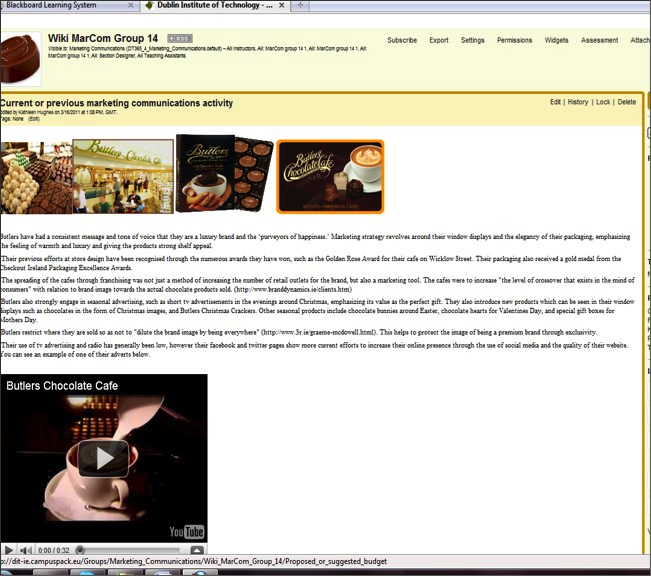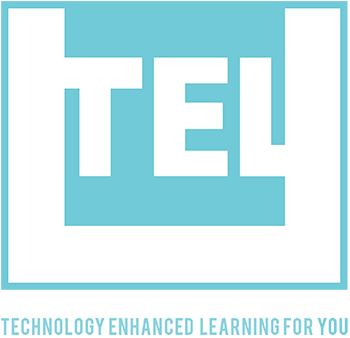 Who are you and where do you teach?
Who are you and where do you teach?
Kathleen Hughes, School of Marketing, College of Business Dublin Institute of Technology. I lecture in marketing modules to a variety of class groups. These range from undergraduate to postgraduate, part-time to full-time. Class sizes vary from 20-120, and often include many nationalities. I also coordinate students business projects while they study abroad in Europe and Asia.
I began incorporating learning technology in order to manage group work with the larger classes, but quickly integrated technology into the learning experience for all students.
What technology do you use for teaching and learning?
One of the technologies that I use to facilitate student’s group work is a wiki. In order to facilitate access and analytics, I opted to use the wiki tool through Blackboard. Wikis allow the students to work together (remotely if they choose), to develop an assessment as required. The lecturer can then access their group wiki, and identify non participants, slow progress, or difficulties that the students may be having, and then provide formative feedback either in class, or though the wiki.
What do you feel are the advantages of using this technology?
Wikis have been shown to foster collaborative learning by allow the student’s to engage with each other. I’ve found that with appropriate guidance, the students begin to move from mere cooperation (dividing up the tasks), to true collaboration – where they take ownership of the assessment as a group, and construct knowledge.
The analytics can provide useful information about individual contribution to the wiki, my evaluations have shown that this has been helpful in persuading students to work more collaboratively, and has reduced free-loading.
How do you use this technology with students?
Mostly for group projects and assessments. However it is also useful for individual projects for distance or part-time students, where personal feedback is not always possible. As training on using the wiki is needed, it works better for semester or year-long projects, or when other modules are also using wikis. At the beginning, some simple tasks are assigned, with the aim of facilitating group formation, and engagement with the wiki, for example:
Form your group; sign in through Blackboard; arrange a meeting to develop some ground rules; document this in your home page in the wiki.
I scaffold the project, and indicate in advance the stages when I plan to review their wikis and provide formative feedback – typically just before half way through the project. This encourages the groups to begin working on it earlier.
The image below is of a student group’s marketing wiki, with pages created for different sections:

What do you think are the main benefits and main drawbacks to using this technology?
Benefits
Social constructivist, collaborative online knowledge creation. Students appreciate the inclusive nature of the wikis, the analytics won’t lie if some of the group members are coasting.
Students can embed audio or video files, such as adverts from YouTube, or even those they created themselves. Some of the comments below are from the students’ feedback:

Drawbacks
Printing documents from wikis can be time consuming, ask for a hard copy of the final version also.
If the assessment isn’t appropriately constructively aligned, students may see this as merely an ‘additional layer’ of documentation and a new, unnecessary, tool. The opportunity for formative feedback has generally negated this potential issue.
Internet access is needed – this can be an issue for some students, those off campus, or abroad.
Students can’t edit pages at the same time – for this reason, some prefer Google Docs. The Blackboard app version is less user friendly.
What advice would you have for someone looking to use this technology with students?
Align the activity to the learning outcomes, and communicate this clearly. Have a clear role for the wiki.
Practice creating and editing pages yourself first, have the group sets and tools created and ready for the students.
The role of the lecturer needs to adapt to facilitator, and guide. The transparency of the wiki highlights students’ challenges, it helps to have anticipated some of the issues, poor understanding, or even lack of participation.
Use the feedback to encourage those who are doing well and with their permission, demonstrate their progress to the others groups.


No comments, be the first one to comment !